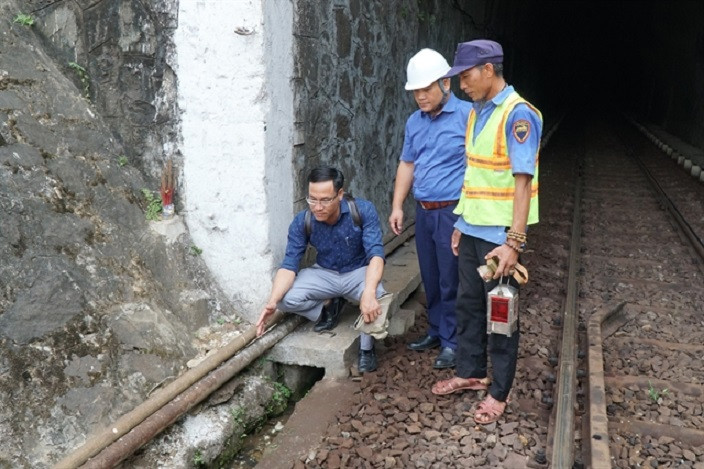
Many bridges and railway tunnels passing through the Hải Vân Pass in Đà Nẵng City have deteriorated, requiring comprehensive upgrades, the unit in charge of the railway system across Đà Nẵng, Quảng Nam, and Quảng Ngãi provinces has said.
The line passing through the Hải Vân Pass is 19.8km long with numerous bridges and tunnels built during the French colonial period nearly 100 years ago.
It traverses areas with complex terrain and geology, making the curvature radius of the track small and the speed through curves low.
There are many deteriorated sections along the route. Tunnel No 9 to Tunnel No 14, with a total length of 2,337 metres was constructed between 1926 and 1931. Among these, Tunnels No 9, No 10, and No 13 with a length of 1,670 metres were upgraded in 2006 using ODA funds.
The remaining Tunnels No 11, No 12, and No 14 with a total length of 1,667 metres have been in use for a long time but have not been upgraded. The structure of the tunnel shells is mainly made of poor-quality concrete or natural stone, which has weathered and deteriorated.
Tunnel No 14 is over 940 metres long, making it the longest tunnel among the six in the Hải Vân Pass area. The tunnel was put into use in 1931 and has deteriorated with dampness.
Cracks are visible on the concrete roof of the tunnel, with water flowing down in streams. There are many alcoves along the tunnel walls for personnel to take shelter when trains pass, but water seepage has formed puddles in these areas.
Hoàng Anh Dũng, deputy director of Quảng Nam-Đà Nẵng Railway Joint Stock Company said in 2021, the unit carried out structural maintenance inside Tunnel 14, constructing a drainage system on both sides of the tunnel to minimise damage from groundwater leakage.
However, for repairing and upgrading the tunnel wall and arch structures, specialised teams and significant funding would be required, so the unit proposed that higher authorities study and provide solutions, he said.
To ensure train safety, the unit dispatches tunnel inspectors daily to check track, switches and tunnel structures along the line.
Along the railway section through the Hải Vân Pass, there are also 36 bridges with a total length of about 688 metres. Among them, there are eight steel bridges with a total length of 129 metres and 28 bridges with a total length of 559 metres.
The steel bridges have been in use since 1975, and the steel beams are now deteriorating. The concrete bridges have also weathered due to environmental factors and time.
To enhance train safety in the area, the company has proposed to the Ministry of Transport and Vietnam Railways Corporation to consider and prioritise allocating funds for upgrading the bridge and tunnel system along the route.
This includes plans to replace rails and switches with new ones, renovate rock base, 16-km-long drainage systems, replace seven steel bridges with concrete ballast track bridges, upgrade Tunnels No 11, 12, 14 and reinforce the embankment at 14 locations prone to landslides. — VNS